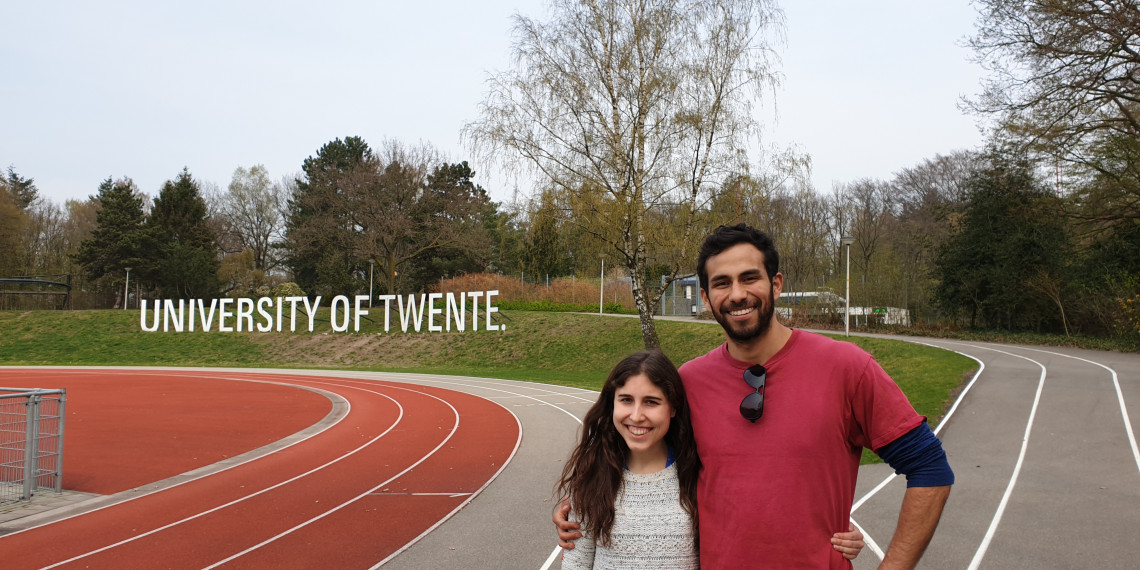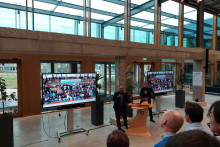Buddy
Universities are fully committed to internationalization. Numbers don’t lie: currently, 55,969 international students are studying in the Netherlands. That is three times as many as ten years ago. For the UT, 35 percent of the total influx of new Bachelor's students consists of international students. The Buddy program connects this expanding group of internationals with experienced UT students (buddies), who show them the way in the first months in the Netherlands. Such a program lasts six months. The couples are formed at every official kick-off of the semester, in September and in February.
Mercedes Feito Zazo (24) from Spain is linked to Alberto Rosas Aguilar (27) from Mexico. Zazo has been studying at the UT since 2017 and is doing the Master's in Educational Sciences & Technology. She is in the final phase of her study and only has to write a thesis. Aguilar has just started his Masters in Sustainable Energy Technology.
Both students are from Spanish-speaking countries. Whether that is the reason why they are linked together as buddies, the two do not know. ‘I think it's a coincidence,’ Zazo says. ‘But,’ Aguilar adds. ‘It's easy. You can easily express yourself in your own language. That is why the ice between us was broken quickly.’
Bicycles and washing machines
‘For me this is the third edition as a buddy,’ says Zazo. ‘When I arrived to Enschede two years ago, my buddy at the time helped me a lot. I am rather shy and it was the first time that I was abroad alone for such a long time. My buddy was very open and suggested to meet before the official program started. She was from the Netherlands and had useful tips, for example about purchasing a new bicycle.‘
'When you go abroad on your own, being alone is a thing'
The contact between Zazo and Aguilar also started with a practical question. Aguilar wondered if he needed a washing machine in his apartment. ‘It is typically a question to which Google has no answer,’ says the 27-year-old Mexican. ‘That's why it's useful to get to know someone who already has more experience in the Netherlands. I finally bought the washing machine, by the way.‘
Reflection
Both students are especially enthusiastic about the social aspect of the Buddy program. The social component of the program in particular cannot be underestimated: one third of the internationals at the UT are struggling with psychological problems - mainly caused by loneliness - and have difficulty integrating. Zazo also experienced a feeling of loneliness at the start of her studies in the Netherlands.
‘Most of my international student friends had the same feeling in their first months. Over time I got to know more people and felt less lonely. If my buddy feels lonely, I will always call him to meet up.‘ Aguilar: ‘I think there is a difference between being solitude and loneliness. I am often alone. Sometimes my reflection is the only person I see during the day. But I don't feel lonely. Buddy also contributed to that: if I didn't have a buddy activity this week, I wouldn't have left my apartment.‘
According to Zazo and Aguilar, the buddy program offers the opportunity for social contact. ‘When you go abroad on your own, being alone is a thing,’ Aguilar knows. ‘Buddy gives you the opportunity to meet other people. At the same time, you have to seize the opportunity yourself.’ Zazo: ‘I also know people who are happy to stay in their own room while the rest is out having a party. It is ultimately up to you.‘

Expectations
Tom Boogerd and Anna Bruijning are on the board of the Buddy program. According to them the psychological complaints of international students are alarming. Boogerd: ‘It's a shame, because there are plenty of opportunities, especially when it comes to social contact. Buddy is a good example of this.’ Bruijning: ‘It remains difficult to reach all international students. This is still a challenge for us. Moreover, sometimes buddies' expectations do not fully match what we do. A pick-up service from Schiphol, which the Erasmus Student Network has always had, or help with finding rooms, that is not Buddy's job. For us it is mainly about the social and cultural aspect.‘
Bruijning continues: ‘Most international students have never been alone abroad and often moved out of their parents’ house for the first time. That is of course quite intense. With Buddy we want to create an accessible platform where people come into contact with each other. The internationals who are just arriving are linked to a buddy who has been living in Twente for at least half a year. In addition to these buddy couples, we organize group activities such as a welcome dinner, a day of skating or a city trip to Rotterdam. This way, we create a large group of friends where someone can feel at home.‘
Twente meets Taiwan
Annemarie ‘’Anny’’ Olde Daalhuis proves that a buddy does not necessarily have to study at the UT. She lives in Enschede, but does not study at the UT or Saxion and never has. This semester she is linked to Chung Yu Yeh (33) from Taiwan, who is following a Master's program in Sustainable Energy Technology at the UT.
‘I especially like to meet people from all over the world,’ says Olde Daalhuis. ‘In recent years I have not had the opportunity to travel. Via Facebook I found out that there is a huge number of international groups and associations in Enschede, often related to the UT or Saxion. I have celebrated Chinese New Year and the Hindu celebration of Diwali, and I am ready for my fourth edition of Buddy.‘
'It mainly revolves around the typically Dutch and untranslatable word gezelligheid'
The first question Olde Daalhuis asks her buddies is what they notice about the Netherlands. ‘I often hear that the air in Enschede is so clean and that it is very calm. Many international students come from huge cities and then Twente is of course very different.’ Yu Yeh: ‘I fully agree with that. I come from a busy area in Taiwan. The first times I tried to sleep in the Hogekamp, I had to turn on some music in the background, it was so quiet in my room. In Taiwan I had an issue with my nose, probably because of the air pollution. That is completely gone since I live here.‘
Language barriers
Yu Yeh also experienced loneliness in the first weeks of his stay in the Netherlands, he tells. ‘English was a problem for me in particular. I am from Taiwan and I was used to written communication in English, but I barely spoke the language. That is why it was difficult in the beginning to get along in groups. I also felt lonely when I closed the door behind me in my studio in the Hogekamp: at those moments I was completely alone.‘
Olde Daalhuis reacts surprised: ‘I knew nothing about that. Otherwise I would have suggested doing something together.’ Yu Yeh: ‘But the buddy program did help, though. I could communicate with you one-on-one in English. That was much easier for me than in groups.‘
Initiative
According to Yu Yeh and Olde Daalhuis, it is important that internationals take steps themselves to break through feelings of loneliness. Something that is endorsed by the Spanish-Mexican couple. The Buddy program can contribute to the integration of international students in the Netherlands, but it is up to the internationals themselves to seize the possibilities. And it is up to Buddy's management to increase the visibility of the program.
Although the program contributes to the good cause, it mainly revolves around the typically Dutch and untranslatable word ‘gezelligheid’. ‘And not to mention the free drinks at the activities,’ Aguilar adds. ‘That's also not completely insignificant.’







